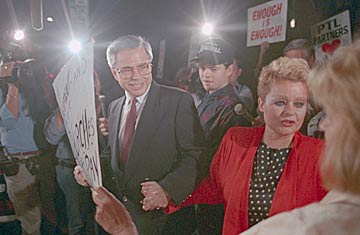
October 03, 1989: PTL founder Jim Bakker (left), his son, Jamie, (center) and wife, Tammy Faye Bakker, greet supporters as they leave federal court in Charlotte
(7 of 8)
Whatever the fallout for American politics, the showy world of born-again broadcasting has surely been shaken. Falwell has gained a new audience but - finds himself saddled with additional responsibilities at a time when his own ministries have run into fiscal problems. A long-running battle with the city of Lynchburg, Va., to win property-tax exemption for his Liberty University is not yet won. Just a year ago Falwell had to lay off 225 employees at his Lynchburg offices because of high university expenses. His broadcast, the Old Time Gospel Hour, was temporarily canceled last week by cable superstation WTBS because of nonpayment of back bills, which a station spokeswoman said ran "well into six figures."
Some analysts see Falwell's PTL maneuver as a masterstroke to forge a new alliance between two Protestant forces that have had little to do with each other -- Fundamentalism and the Pentecostal-charisma tic movement. But during an appearance in Cocoa Beach, Fla., last week, Falwell said he had another reason for acting: "If Heritage Village were to go down the tubes, it would affect every Christian person in America."
Observers of Evangelicalism predict that, in the short run at least, PTL supporters will rally around their beleaguered organization. The TV ministries like PTL occupy powerful positions because they meet the spiritual and emotional needs of millions of viewers. Indeed, loyal fans of the Bakkers reacted with surprising equanimity to the couple's disappearance. Ron Olguin, manager of New Mexico's Bernalillo County and a daily viewer of religious TV, contributes upwards of $10,000 a year to televangelists. He is irritated by all the criticism of the Bakkers. "These people have done a lot of good in their lives," he says. I. Delbert Rose, an Idaho freight salesman, is not bothered by the lavish life-style that the Robertses and the Bakkers are said to enjoy. To him, "their rewards should be great, because they've done great things for the Lord."
Talk about television always gets down to money. The TV preachers have a voracious need for cash in order to stay on the air, and they have been stubbornly unwilling to report what they do with all the donations they receive. Evangelical Theologian Carl F.H. Henry predicts a "growing pressure for public financial accountability from all religious broadcasters who solicit funds over the airwaves . . . The personal life-styles of those who appeal for sacrificial support will also come under more scrutiny by the churches and by a skeptical society." To Presbyterian Minister Ben Haden of Chattanooga, Tenn., a pastor and radio-TV speaker, such changes will be good for evangelism: "The No. 1 stumbling block to the unbeliever about the Christian faith is not the Cross or the Second Coming or the Virgin Birth. It is the money angle."
